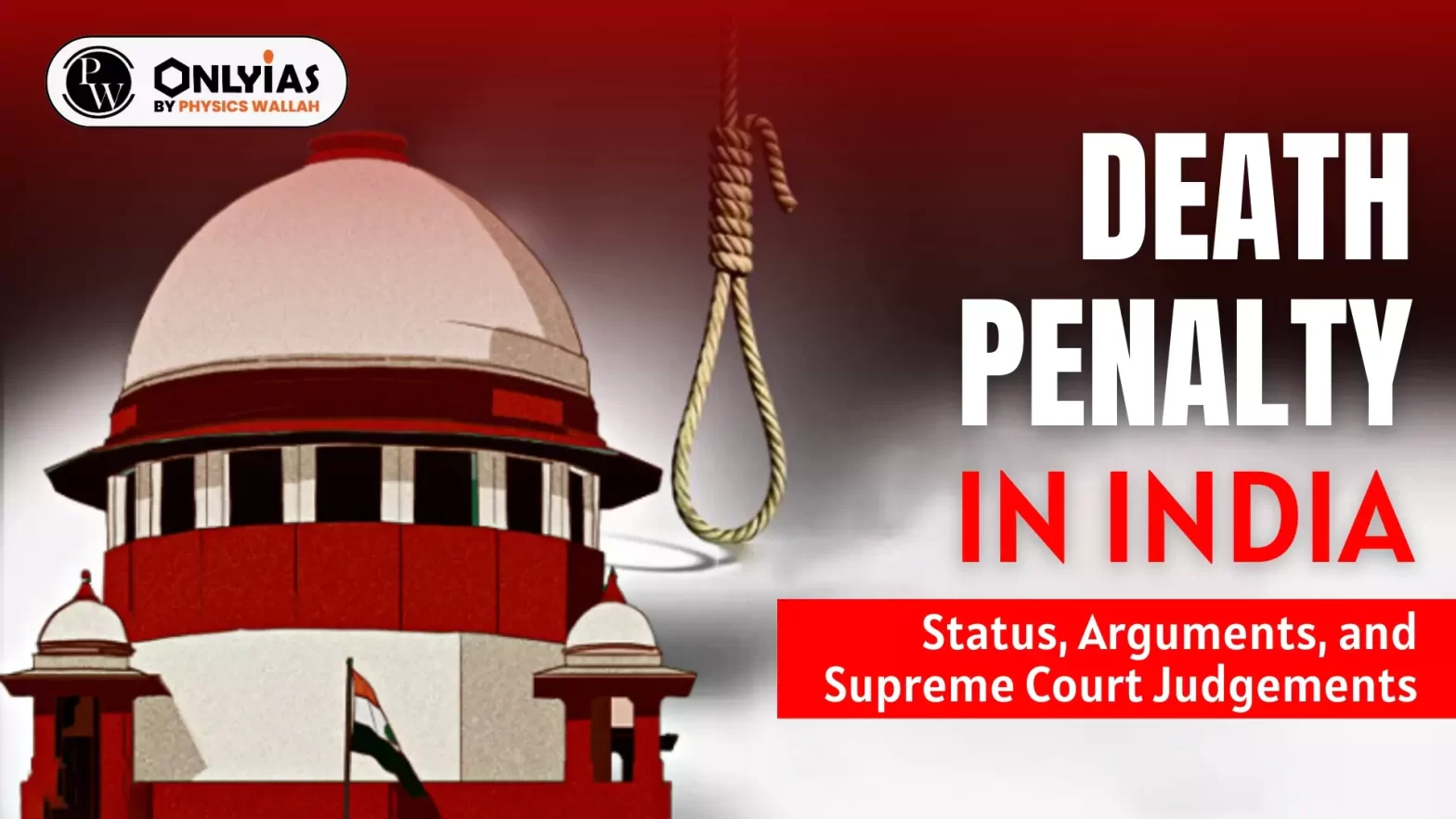Death Penalty in India: Status, Arguments, and Supreme Court Judgements

This editorial is based on the news “ Death by nitrogen: Why this Alabama execution is polarising ” which was published in the Hindu. In Alabama, USA a convict has been executed using nitrogen hypoxia for the first time as a method of Death Penalty.
About Death Penalty
- A Death Penalty: It is ordered by the state owing to the commission of a Crime. Crimes that can result in the death penalty are known as capital crimes or capital offences.
- Purpose: The prime reason is its efficacy in deterring identical or similar crimes.
Status of Death Penalty Across World
- 36 countries worldwide practise it, and 103 countries have completely abolished it for all crimes.
- European Union : Article 2 of the Charter of Fundamental Rights prohibits its use.
- Council of Europe: It has 47 member states, and prohibits the use of the death penalty.
- Although many nations have abolished Death Penalty, China, India, the United States and Indonesia continue to apply the death penalty.
Death Penalty in India: Statics
- The Statistics: As per ‘Death Penalty in India: Annual Statistics 2022’ report , the Supreme Court awarded the death penalty to only seven people from 2007 to 2022. All death sentences were either set aside or commuted to life in 2023, as they missed the “rarest of rare cases”.
- By Trial Courts: They awarded 165 death sentences in 2022 , the highest in over two decades.
- Statutory Provision : The Air Force Act, of 1950, The Army Act, of 1950, and The Navy Act, 1957 provide punishment for offences, including hanging or death by shooting.
Supreme Court Judgement on Death Penalty in India
- Jagmohan Singh vs State of Uttar Pradesh (1972): It upheld the death penalty in India.
- Rajendra Prasad vs State of Uttar Pradesh (1979): The court held that the death penalty directly affects the life of the people guaranteed under Article 21 of the Constitution. To impose death penalty, the two things are required:
- The s pecial reasons should be recorded for imposing the death penalty in a case.
- The death penalty in India must be imposed only in extraordinary circumstances.
Arguments in Favour of Death Penalty in India
- Retribution: Death sentence is seen as just retribution for murderers.
- Utilitarianism: It conveys that the consequential welfare of the society outweighs the deprivation of life of the criminal.
- Deterrence: Death sentence serves as a deterrence to potential offenders.
- Public Safety: The public has to be safeguarded against the possibility of release of a murderer.
- Least Humane Method: It is the least common method of execution in addition to not being harsh or inhumane.
Arguments Against Death Penalty in India
- Violation of Right to Life: It violates the right to life guaranteed by the Indian Constitution .
- Alternative Methods: According to the Indian Constitution, state-sanctioned executions have to be as comfortable and painless as possible .
- Poor Deterrence Effect: Social scientists had shown the death penalty had no deterrent effect and that public opinion worldwide was in favour of its abolition.
- Scope for Reform: Life imprisonment offers a chance for rehabilitation, whereas it doesn’t.
- Execution of Innocent: In some cases, special or military courts set up through counter-terrorism laws have sentenced civilians to death, undermining international standards.
- Discriminatory: The death penalty Report of India shows that around 76% of convicts of Death Penalty belonged to lower and backward castes.
- An Alternative: The Bharatiya Nyaya Sanhita , 2023 has defined ‘life imprisonment’ as a term for the remainder of one’s natural life, and this should be the default alternative to death sentences.
- Option for Remission: Remove Death Penalty from the statute book and introducing a rational and universal remission policy will be a substantive reform in the justice system.
- Rehabilitation: It is the moral right of the convict to seek the help of society.
- Law Commission Recommendation: Death penalty should be abolished, except in certain cases where the accused is convicted in terror related offence.
| Mains Question: Critically analyse whether the death penalty is justified in the modern times. (10 marks |150 words) |
| Must Read |
| NCERT Notes For UPSC | UPSC Daily Current Affairs |
| UPSC Blogs | UPSC Daily Editorials |
| Daily Current Affairs Quiz | Daily Main Answer Writing |
| UPSC Mains Previous Year Papers | UPSC Test Series 2024 |


